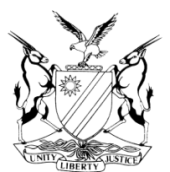REPUBLIC OF NAMIBIA

IN THE HIGH COURT OF NAMIBIA, MAIN DIVISION, WINDHOEK
REVIEW JUDGMENT
PRACTICE DIRECTIVE 61
Case Title: The State v Enox Sambu | Case No: Cr 74/2023 | |
High Court MD Review No: 936/2023 | Division of Court: Main Division | |
Heard before: January J et Christiaan AJ | Delivered on: 7 July 2023 | |
Neutral citation: S v Sambu (CR 74/2023) [2023] NAHCMD 391 (7 July 2023) | ||
The order: The conviction and sentence are set aside; | ||
Reasons for the above order: | ||
CHRISTIAAN AJ (JANUARY J concurring): [1] The accused appeared in the Windhoek Magistrate’s Court on contraventions of the Immigrations Control Act, No 7 of 1993 (the Act). The accused pleaded guilty and was convicted of contravening s 12 (1) read with section 1, 2, 4 and 12 (4) of the Act. The State alleged that the accused who is not a Namibian citizen or person domiciled in Namibia failed to produce an unexpired passport to an immigration officer on demand. [2] When the matter came before us on review I queried the learned magistrate why the charge sheet failed to address the pertinent elements of the offence enjoined in s 12(1) and s 12(4), namely; the refusal of entry and the failure of the accused to, on demand by an immigration official produce an unexpired passport bearing a valid endorsement were not addressed in the charged sheet and during the s 112(1)(b) questioning of the accused. Could court be satisfied that the accused admitted all the elements of the offence and whether the accused was correctly charged with contravening s 12(1). [3] The learned magistrate in her response conceded that she realised that the accused were not correctly charged and questioned with contravening s 12(1) of the Act. [4] While s 12 (1) read with s 12(4) of the Act stipulates: ‘(1) Any person seeking to enter Namibia who fails on demand by an immigration officer to produce to such immigration officer an unexpired passport which bears a valid visa or an endorsement by a person authorized thereto by the Government of Namibia to the effect that authority to proceed to Namibia for the purpose of being examined under this Act has been granted by the Minister or an officer authorized thereto by the Minister, or such person is accompanied by a document containing a statement to that effect together with particulars of such passport, shall be refused to enter and to be in Namibia, unless such person is proved to be a Namibian citizen or a person domiciled in Namibia. (4) If any person enters or has entered Namibia in contravention of the provisions of subsection (1) or, after having been refused to enter Namibia in terms of that subsection, is found in Namibia, he or she shall be guilty of an offence and on conviction be liable to a fine not exceeding R20 000 or to imprisonment for a period not exceeding five years or to both such fine and such imprisonment, and may be dealt with under Part VI as a prohibited immigrant.’ [5] With regard to count two, the charge sheet did not contain the necessary averments to sustain the offence s 12(4) creates two offences, i.e that of entering Namibia in contravention of the provisions of subs (1) of s 12 of the Act and that of being found in Namibia after having been refused to enter Namibia in terms of subs (4) of s 12 of the Act. However the magistrate’s enquiry under s 112 (1) (b) of the Criminal Procedure Act, 1977 did not cover all the allegations made in the charge sheet. No questions were directed to the accused on whether or not he had previously been refused entry in Namibia by an immigration officer under s 12(1). Nor were admissions made to that effect. On a proper construction of subsection (4) the magistrate could not have convicted the accused as indicated on the charge sheet. The exclusion of these pertinent elements enjoined in s 12(1) and s 12 (4) renders the charges defective. [6] Ndauendapo J, with Siboleka J concurring in the State v Okuani1 set aside a conviction and sentence and directed magistrates and prosecutors to make sure that the pro-forma charge sheets are corrected to have regard to the contents of these two sections. I see no reason why I should deviate from the corrective matter suggested in the Okuani matter. [7] In the result, I make the following order: The conviction and sentence is set aside. | ||
P CHRISTIAAN ACTING JUDGE | HC JANUARY JUDGE | |
1 S v Okuani (CR 07 /2013 [2013] NAHCMD 32 (5 February 2013).